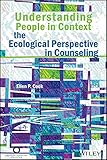Understanding people in context : the ecological perspective in counseling / edited by Ellen P. Cook.
Publisher: Alexandria, VA : American Counseling Association, [2012]Copyright date: ©2012Description: 1 online resourceContent type:- text
- computer
- online resource
- 9781119222743
- 1119222745
- 9781119026495
- 1119026490
- 1556202873
- 9781556202872
- 158.3 23
- BF636.6 .U533 2012eb
| Item type | Current library | Home library | Collection | Call number | Materials specified | Copy number | Status | Date due | Barcode | |
|---|---|---|---|---|---|---|---|---|---|---|
| AM | PERPUSTAKAAN TUN SERI LANANG | PERPUSTAKAAN TUN SERI LANANG KOLEKSI AM-P. TUN SERI LANANG (ARAS 5) | - | ebook (Browse shelf(Opens below)) | 1 | Available |
Includes bibliographical references and index.
Understanding People in Context: The Ecological Perspective in Counseling; Table of Contents; Acknowledgments; About the Editor; About the Contributors; Part I: Understanding the Ecological Perspective; 1: Introduction; Problems With Individual Explanations for Behavior; The Metaphor of Ecology; The Ecological Perspective: Fundamental Propositions; Behavior Is Both Personal and Contextual; Behavior Is Interactional; Behavior Is Meaningful; Goals of Ecological Counseling; Organization of the Book; References; 2: Behavior Is Personal; Background: Just How Personal Is Behavior?
Personality and TraitsThe Nature of Traits; How Traits Interact With Environments; Characteristic Adaptations; Happiness and Psychological Wellness; Resilience; The Self, Identity, and Self-Esteem; Sociocultural Identity; The Gendered Self; Summary; Discussion Questions; References; 3: Behavior Is Contextual; Overview: The Nature of Contexts; Origins of the Ecological Perspective; Physical Contexts of Human Behavior; Interpersonal Contexts of Human Behavior; Overview: Subsystems or Levels of Interpersonal Contexts; Near and Dear Infl uences: Microlevel Relationships; The Ecological Niche.
Neighborhoods and Public Community SettingsInstitutions: Invisible Yet Powerful Social Structures; The Macrosystem: Culture and Human Behavior; The Context of Poverty; The Reality of Power in Our Social World; Global Transformative Changes in Our World?; Summary; Discussion Questions; References; 4: Behavior Is Interactional; The Nature of Person-Environment Interactions; General Descriptions of Person-Environment Interactions; Defining a Good Fit in P {u00D7} E Interactions; Ecological Definitions of P {u00D7} E Interactions; When Fit Is Not Enough: The Example of Work.
P {u00D7} E Interactions and DevelopmentThe Ecology of Human Development: General Statements; P {u00D7} E Interaction and Development Occurs Over Time; Conceptions of Time as a Variable in P {u00D7} E Interactions; Biological Age; Social Age; Generational Effects; P {u00D7} E Interaction in Everyday Life; The Coping Process; Roles in Everyday Life; Home-Career Conflicts; P {u00D7} E Interaction: Another Look at Diversity; Summary; Discussion Questions; References; 5: Behavior Is Meaningful; What Is Meaning Making?; Background: Meaning Making and Counseling; Defining Meaning Making; Language as a Building Block.
The Process of Making Distinctions and Its ConsequencesStereotyping; How Difference Becomes Discrimination; Pervasive Meaning Making: Religious and Spiritual Meanings; Other Examples of Pervasive Meaning Making; Everyday Explanations of Events; Political Ideology; The Process of Meaning Making; Making Meaning About One's Life; Meaning Making and Resilience; Meaning Making in Extremis: Living After Loss; Summary; Discussion Questions; References; 6: Behavior Is Changeable; A Review of Basic Principles of the Ecological Perspective; Individual Counseling in the Ecological Perspective.
This exceptional book emphasizes uniquely designed interventions for individual counseling, group work, and community counseling that consider clients as individuals within the contexts of families, cultural groups, workplaces, and communities. Part I describes the theoretical research base and major tenets of the ecological perspective and its applications to counseling practice. In Part II, experts who have used the ecological perspective in their work discuss its usefulness in various applications, including counseling diverse clients with specific life challenges; assessment, diagnosis, an.
Vendor-supplied metadata.
There are no comments on this title.

